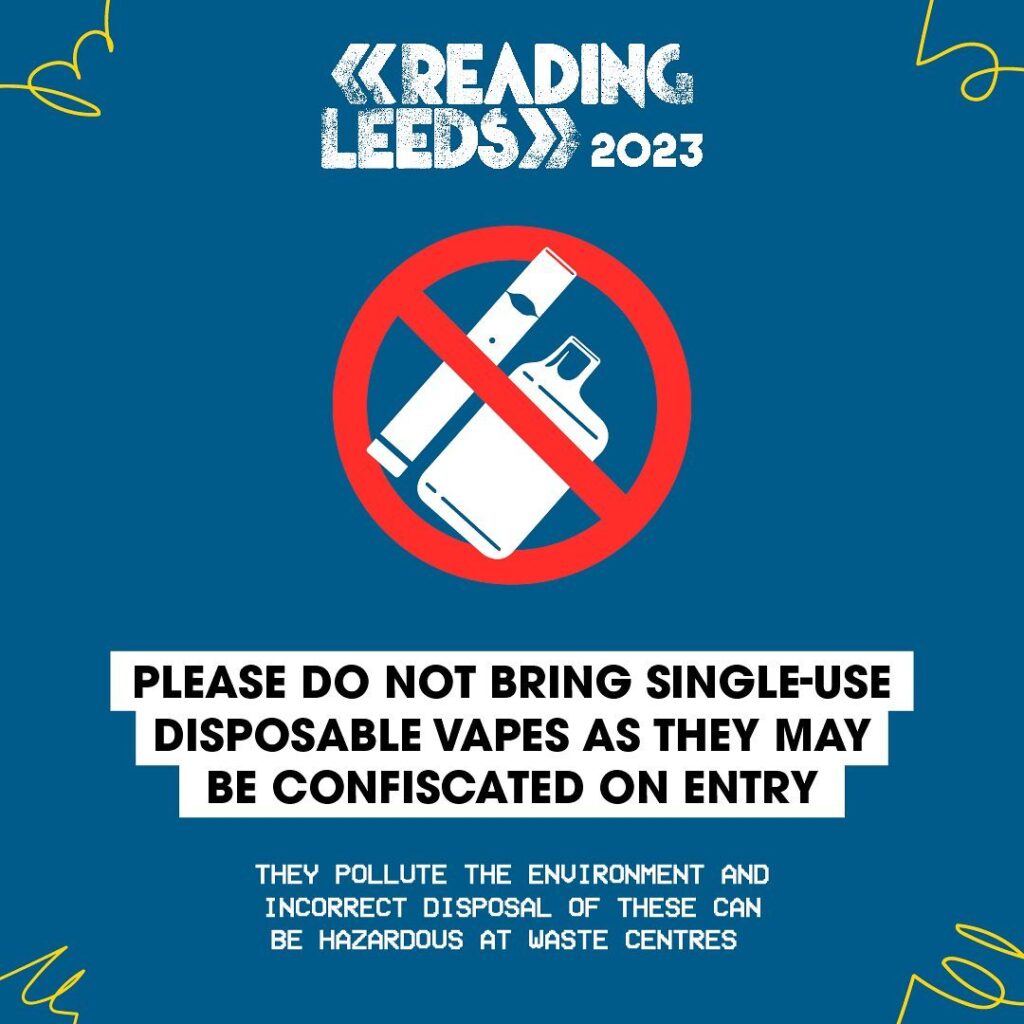We Need To Talk About Disposable Vapes
Words: Dray Morgan
The E-cigarette market is completely changing how we consume nicotine. The substance is more accessible now than it has been in the past two decades. It is one of the fastest growing industries in the world. With the market for vapes expected to grow by another third before the end of the 20s, governments need to be ahead of the curve to stop novel products from damaging people and the environment.
What was once seen as a fairly innocuous means of weaning off cigarettes, now sees a new generation hooked on nicotine and another form of plastic pollution arriving in the middle of an environmental crisis.
Bins around Ireland are covered in Lost Mary stickers and if you have been to a music festival this summer, you’ve probably had to wade through the hunks of plastic on the ground to see your favourite artist. So what can we do?
Two of the biggest festivals in the UK, Reading and Leeds Festival, announced yesterday that they were banning disposable vapes on their grounds. They cited pollution of the environment and being hazardous if not disposed of properly as their reasoning.

Earlier this year, Glastonbury issued a statement asking festival goers not to bring disposable vapes for similar reasons. So are we as a society finally becoming sick of these one use E-cigs?
In the past decade, the perception of the vape (or E-cigarettes) has changed drastically. At the start of the 2010s, we saw this new technology as a little bit lame and definitely not something that a teen would be into.
Move forward ten years, and you can’t walk down the street without seeing multiple people of all ages with a vape in hand and a cloud of slightly sickly smelling vapour surrounding them. However, this time it’s far less innocuous.
According to the BBC, cigarette smoking is down year on year, but vaping is increasing. 3.3 per cent of people use a vape every day in Ireland, which is twice the EU average. This makes us the third highest users of e-cigarettes in Europe.

One of the biggest online vape vendors in the UK, indejuice, reported a 279 per cent increase in sales from the third quarter of 2021 to the fourth. This has resulted in them being labelled the eighth fastest-growing e-commerce company in the country. 60 per cent of these sales were fruit flavoured.
Chief Technology Officer Hakeem Javaid said, “What’s even more exciting is the number of new customers that have taken their first effective step in quitting smoking”. Although this may seem encouraging, Mr. Javaid is only making the assumption that these new customers have come directly from smoking.
According to the British Action on Smoking and Health, 43 per cent of people who vape were never smokers with that number increasing year on year.
And the NHS recently released data stating almost one fifth of all British 15-year-olds vape, with Irish numbers mirroring this at 10-18 per cent of 11-18 year olds vaping.
Furthermore switching from reusable to disposable vapes has created another issue. Severe waste. The outer coating of the vape will never break down. It is a single use plastic and will never degrade beyond becoming damaging microplastics.
A disposable’s lithium battery is actually designed to be charged up to five hundred times. However, often design restrictions prevent refilling and that means this valuable and in demand natural resource is being wasted at an alarming rate.
More than 90 tonnes of lithium were used in the production of the $5 billion worth of single-use vapes sold globally last year. That’s enough lithium to supply more than 11,000 electric vehicles. They also contained roughly 1,160 tonnes of copper, enough for 1.6 million home electric vehicle chargers.
Three million vapes are thrown away per week globally. These batteries can be recycled if disposed of properly however UCC released a report citing “substandard national recycling and waste management practices, resulting in most vapes being sent to landfill or incinerators in Ireland.”
Vape retailers are obliged to provide facilities that allow the recycling of vapes in stores that sell them. Waste Electrical and Electronic Equipment (WEEE) Ireland states, “Rechargeable vaping and e-cigarette devices can be recycled correctly if the tank is removed prior to recycling”.
Being realistic, nobody is dismantling their vape, saving it, bringing it to the shop, locating the bin and recycling properly. This has resulted in millions of vapes going to landfill and being scattered on city streets.
And even semi-reusable vapes are culprits. Vapes like Juul contain removable cartridges which much like disposables, cannot be recycled. The nicotine and chemicals in the carts mean that residual material is too toxic to go through the recycling process.
The concept of nicotine addiction is changing rapidly. The difference between the public perception of cigarettes and disposable vapes is vast. Societal ignorance of the drawbacks of disposables is staggering. We can only look to The Government to enforce these companies.
In May of this year, Ireland became one of the first countries to propose an outright ban on vape sales to children. What might seem a simple piece of legislation, Ireland being one of the first countries to implement this shows how far behind governments are to regulate vapes.

Vapes are by definition, toxic waste. Their incorrect disposal leads to battery acid, harmful chemicals and microplastics seeping into our ecosystems. The predatory businesses prey on young people by taking advantage of a lack of regulation and local communities are suffering from littering. Without government intervention, we may see significant steps backwards relating to nicotine addiction in teens and environmental welfare.
E-cigarettes have been able to evade proper legislation for too long. A lax government approach has created yet another generation at the mercy of nicotine. The lack of restrictions and information means that what was an encouraging decrease in nicotine addicts in the last decades, has plateaued.
It is a fact that disposable vapes are having a negative impact on society in many ways. Young people are being targeted by a multi-billion dollar industry pretending to care about their consumer’s welfare. Tonnes of lithium, the most sought after metal in the world, is being mined through unethical processes and thrown in landfill after one use.
Worst of all is that we already know this. We are actively avoiding this reality because it’s simply inconvenient for us to address. The phrase “disposable” is a lie, just because you can throw it in the bin doesn’t mean it is disposed of. Using a tote bag or buying a reusable coffee cup is pointless if you’re not giving up the blue raspberry ice.
Vaping is no longer just a means to get off cigarettes. It has become its own entity which should be treated as such. It is not a controversial statement to say that vapes are bad for the environment and for people. But what use is that knowledge if steps aren’t being made to reduce the impact of vaping on society as much as possible? The harsh reality is if nothing changes, we’re looking at several future generations still combatting nicotine addiction.






